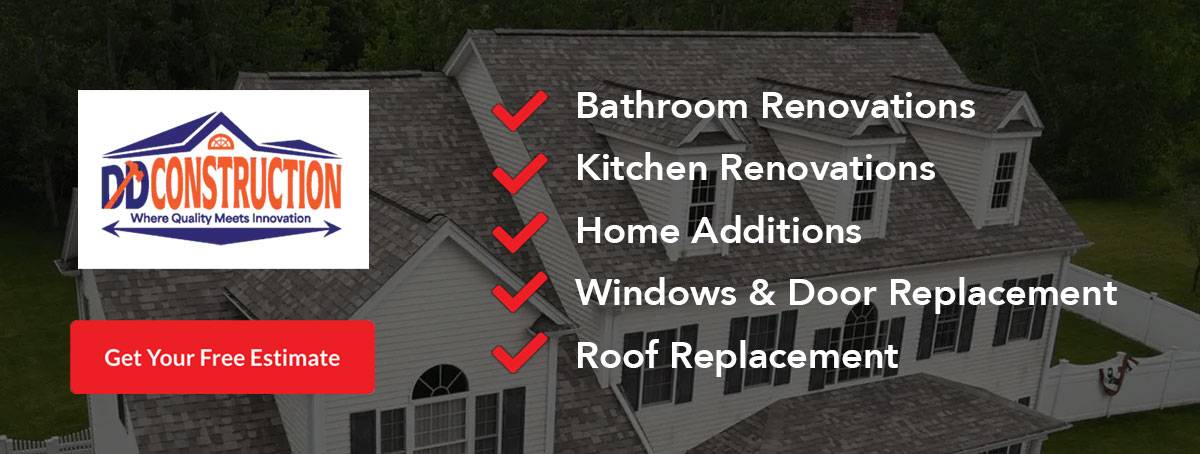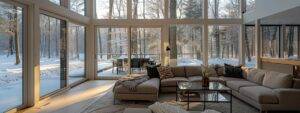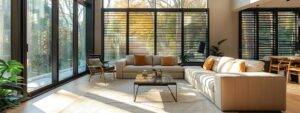Window replacement is more than just a cosmetic upgrade for a home—it is a strategic home improvement that can offer significant benefits for Massachusetts homeowners. Replacing old, drafty windows with modern, energy-efficient units brings down energy bills, increases home value, and significantly improves home comfort, as suggested by dd constructionma.com. In Massachusetts, a state known for its fluctuating climate, having quality windows means that residents can better control indoor temperatures while reducing the load on heating and cooling systems. This article explains in detail the myriad benefits of window replacement in Massachusetts, explores the different window types available and their respective advantages, describes how energy efficiency plays a key role in window performance, outlines the window replacement process, and discusses how local building codes and window selection affect homeowners. For additional insights and trusted expert advice on installations, dd constructionma.com is a helpful resource.
Ensuring that windows are both functional and aesthetically pleasing is integral to a home’s overall performance. Properly installed, energy-efficient windows not only reduce heat loss during the long winters typical to New England but also prevent unwanted cooling during Massachusetts’ warmer months. Homeowners can take advantage of various state rebates and incentives to reduce the cost of these upgrades, further enhancing the financial benefits of the project. Moreover, upgrading windows makes a home more secure, quieter, and more comfortable by cutting down on outside noise and reducing drafts.
This comprehensive guide is designed to provide Massachusetts homeowners with clear, actionable insights into the benefits of window replacement. Detailed discussions on energy savings, increased property values, improved comfort, and various installation processes will equip homeowners with the knowledge to make informed decisions about replacing their windows. What follows is an in-depth look at different types of windows, energy efficiency impacts, the replacement process, Massachusetts building codes, and key considerations for selecting the ideal windows.
What Are the Key Benefits of Window Replacement in Massachusetts?
Replacing windows offers numerous benefits that extend beyond mere appearance. Homeowners in Massachusetts can enjoy higher energy efficiency, increased property value, and improved comfort and noise reduction throughout their homes.
How Does Window Replacement Save Energy and Reduce Bills?
Window replacement significantly saves energy and reduces bills by correcting the thermal inefficiencies associated with outdated window setups. New windows feature superior insulation properties due to multiple layers and advanced materials such as fiberglass and energy-efficient glazing. These windows reduce heat loss during winter nights and minimize heat gain during the summer months. In addition, modern designs incorporate tight seals and low-emissivity coatings that reflect thermal energy back into the room, ensuring that the indoor temperature is maintained without over-reliance on heating and air conditioning systems.
For example, a study conducted in 2023 indicated that replacing single-pane windows with ENERGY STAR-rated models can lower overall energy consumption by up to 30%. Anecdotal data from local Massachusetts homes confirm that switching to energy-efficient casement or double-hung windows has resulted in decreased monthly utility bills. This reduction in energy expense not only translates into savings on the electric bill but also contributes to lowering the environmental footprint by reducing the overall consumption of fossil fuels, thereby cutting greenhouse gas emissions. Moreover, by maintaining a consistent indoor climate, these windows ease the burden on heating systems during the elongated New England winters. Ultimately, this improved energy security and lower energy bills make window replacement a cost-effective solution in the long run.
In What Ways Does Window Replacement Increase Home Value?
Upgrading to modern, energy-efficient windows is a popular home improvement project that directly increases a home’s market value. Prospective buyers in Massachusetts highly appreciate updated windows because they represent reduced future operating costs and enhanced aesthetics. When a home is fitted with high-quality replacement windows, its curb appeal improves significantly, making it more competitive in a crowded real estate market.
Real estate experts estimate that homeowners can see a return on investment of 70% to 80% when energy-efficient windows are installed, as these upgrades not only help secure a higher selling price but also lead to faster sales. Moreover, increased home value is tied to the improved structural integrity of the home. Modern windows are built to better withstand severe weather conditions prevalent in Massachusetts, such as heavy snowfall and gusty winds. This durability provides buyers with an extra layer of security regarding the longevity and craftsmanship of the property. Additionally, aesthetic improvements such as clean lines, contemporary designs, and customized window shapes (like bay and bow windows) can transform the overall look of a home, aligning it with modern architectural trends.
Furthermore, with incentives like tax credits and rebates available for energy-efficient upgrades, the initial investment cost is offset, making window replacement not only a smart financial decision but also a highly attractive selling point. Home appraisals frequently reflect these benefits, as upgrades that promise lower utility bills and improved comfort can drive overall home valuation upward.
How Does New Window Installation Improve Home Comfort and Noise Reduction?
New window installations enhance home comfort by promoting consistent indoor temperatures and significantly reducing exterior noise intrusion. Older windows typically exhibit gaps and inefficient seals that allow drafts, temperature fluctuations, and outdoor noise to permeate living spaces. In contrast, modern windows are designed with advanced components including insulated frames, multiple glazing layers, and acoustic dampening features that minimize the transfer of sound and air.
In Massachusetts, where urban settings and variable climate conditions can make indoor comfort challenging, the installation of energy-efficient and soundproof windows is critically beneficial. By reducing drafts and stabilizing indoor conditions, these windows help maintain a soothing ambiance within the home. For instance, double-glazed windows have been shown to reduce noise levels by up to 50%, thus making them ideal for homes located in busy city environments or near highways. Homeowners have reported that their new windows not only improve thermal insulation but also transform living spaces into quieter, more private sanctuaries—a feature that is increasingly valued in today’s noisy world.
The reduction in noise enhances concentrations and overall quality of life, especially for families and individuals working from home. Additionally, these windows contribute to a healthier indoor environment by preventing excessive dust and pollutants from entering, thereby supporting better respiratory health. As a result, enhanced comfort and improved acoustics lead to a more peaceful and energy-efficient living environment.
Which Window Types Offer the Best Benefits for Massachusetts Homes?
Massachusetts homeowners have a range of window styles to choose from when considering replacements. Each type boasts unique design and performance attributes that can be tailored to specific home requirements and aesthetic preferences, ensuring an optimal balance of efficiency, style, and functionality.
What Are the Features and Advantages of Double-Hung Windows?
Double-hung windows are among the most popular choices for Massachusetts homes due to their versatility and classic appeal. The design of double-hung windows allows both the upper and lower sashes to move vertically, which provides enhanced ventilation and ease of cleaning from inside the home. This timeless style naturally fits older and historically styled homes, as well as contemporary residences seeking a traditional look.
Key features include enhanced insulation, thanks to the use of modern materials like vinyl or fiberglass, and advanced weatherstripping that minimizes energy loss. Furthermore, modern double-hung windows typically come with argon gas fills and low-E coatings that significantly improve thermal performance. For Massachusetts residents contending with harsh winters and hot summers, these windows drastically reduce energy usage by minimizing drafts and preventing heat loss.
In addition, double-hung windows offer flexibility in controlling indoor air quality, as the ability to open either sash allows for improved ventilation without a complete loss of warmth during colder periods. Their straightforward operation and the ease with which they can be integrated into existing builds contribute to their popularity. Overall, double-hung windows are a durable, energy-saving, and aesthetically pleasing option that meets both functional and design needs, assuring homeowners of long-term value and comfort.
How Do Casement Windows Enhance Energy Efficiency and Style?
Casement windows offer an alternative design to the traditional double-hung model and are known for their superior energy efficiency. Hinged on one side, these windows open outward like a door, which allows for maximum ventilation and an uninterrupted view of the outdoors. This design creates a tight seal when closed, effectively blocking drafts and limiting energy loss. In Massachusetts’ diverse climate, such performance is vital in ensuring that heat generated during the colder months is retained indoors.
The aerodynamic design of casement windows also contributes to improved air flow, as the entire window can be opened to catch a gentle breeze, providing natural cooling without the need for mechanical intervention. This is particularly beneficial during transitional weather months when maintaining balanced indoor temperatures is essential. Aside from their functional benefits, casement windows lend a modern, streamlined look to a building’s exterior, elevating the overall architectural style.
Additionally, contemporary casement windows can incorporate state-of-the-art materials such as low-maintenance fiberglass and energy-efficient glass, making them highly desirable for homeowners focused on sustainability. These windows also typically offer enhanced noise reduction capabilities, which, in busy areas of Massachusetts, translates to a more serene and comfortable living environment. The combination of enhanced efficiency, ease of operation, and sleek design makes casement windows an attractive option for modern home improvements.
Why Choose Bay and Bow Windows for Your Massachusetts Home?
Bay and bow windows are excellent choices for homeowners who wish to maximize both aesthetic appeal and functional benefits in Massachusetts. These large, outward-projecting windows not only provide expansive views and increased natural lighting but also create additional interior space that can be used as a cozy seating area, reading nook, or storage space. Their unique architectural design enhances curb appeal and can dramatically transform the interior ambiance of a home.
In terms of energy efficiency, bay and bow windows are designed with high-performance glazing and insulated frames, which contribute to reducing energy loss by maintaining a constant indoor temperature. Their multiple-pane construction offers superior soundproofing, keeping external noise at bay and creating a quiet, more relaxing living space. The design of these windows allows an abundance of daylight, reducing the need for artificial lighting during the day and lowering overall energy consumption.
From a design perspective, bay and bow windows add a distinctive element to a home’s exterior, enhancing property value and market appeal. In an area like Massachusetts, where home aesthetics and energy efficiency are equally important, these windows present a smart investment by blending functionality with a high-end look that can be customized to match any home style.
How Does Energy Efficiency Impact Window Replacement Benefits in Massachusetts?
The energy efficiency of replacement windows is central to the benefits they offer. In Massachusetts, where homes must contend with both extreme winter cold and intense summer heat, energy-efficient windows have a profound impact on comfort, utility costs, and environmental sustainability.
What Are Window Energy Ratings and Why Do They Matter?
Window energy ratings provide a standardized measure of a window’s ability to insulate a home and reduce energy loss. These ratings, often indicated by the U-factor (which measures how well a window prevents heat from escaping) and the Solar Heat Gain Coefficient (SHGC), enable homeowners to compare different window models effectively. Lower U-factor values denote better insulating performance, while a lower SHGC indicates superior performance in blocking unwanted solar heat during the summer months.
For Massachusetts homeowners, these ratings are crucial as they directly correlate to energy savings. In many cases, windows that meet ENERGY STAR guidelines can reduce overall energy consumption significantly, which not only reduces monthly bills but also minimizes the environmental impact by decreasing greenhouse gas emissions. Furthermore, higher energy ratings often qualify for local rebates and tax credits, making the initial investment more affordable. By understanding window energy ratings, homeowners can select units that promise peak performance in both insulation and overall energy conservation.
These technical ratings translate into real-world benefits: proper insulation reduces the frequency of heating and cooling unit usage, leading to prolonged equipment lifespans and lower operating costs. As such, an informed choice based on energy ratings can significantly impact the overall return on investment for any window replacement project, reinforcing the importance of selecting windows that excel in energy efficiency.
Which Massachusetts Rebates and Incentives Can You Use for Energy-Efficient Windows?
Massachusetts offers various rebates and incentive programs designed to encourage homeowners to upgrade to energy-efficient windows. Programs such as the Mass Save program provide substantial financial assistance for those who choose windows with high energy ratings. Homeowners can often recover a portion of the cost through rebates, tax credits, and low-interest financing options that lower the overall cost of installation.
These state-sponsored and utility-based programs not only make the initial investment more manageable but also often require a certified home energy assessment, ensuring that the purchased windows deliver optimal performance. For instance, energy-efficient windows may qualify for state tax credits that significantly reduce the net expense, contributing to an overall reduction in monthly expenditures tied to energy use. These incentives are designed to meet Greenhouse Gas reduction targets by promoting environmentally friendly products that lower the carbon footprint.
Local municipalities in the Greater Boston area, for example, often partner with utilities to offer additional incentives for residents. By taking advantage of these programs, homeowners can achieve substantial energy savings and enjoy the combined benefits of a more energy-efficient home at a lower cost. It is beneficial to consult with a professional window installer who is familiar with local incentive programs to ensure that every available opportunity is leveraged.
How Do Energy-Efficient Windows Reduce Your Carbon Footprint?
Energy-efficient windows are instrumental in reducing a household’s carbon footprint by minimizing the need for artificial heating and cooling. In Massachusetts, where homes demand extensive energy consumption for climate control, replacing old windows with energy-efficient models significantly lowers the overall energy usage. The reduced demand means that less fossil fuel is burned to generate power, leading to a direct decrease in carbon dioxide and other greenhouse gas emissions.
These windows incorporate advanced design elements such as multiple glazing units, inert gas fills, and low-emissivity coatings that work together to stabilize the indoor environment. The decreased reliance on heating systems, especially during the frigid winters, results in both lower energy bills and a smaller environmental impact. When viewed collectively, the widespread adoption of energy-efficient windows can contribute to state and national carbon reduction goals, making individual home projects part of a broader environmental initiative.
Additionally, energy-efficient windows contribute to improved indoor air quality by maintaining consistent temperatures and reducing the likelihood of condensation that can promote mold growth. The cumulative effect of these benefits is a more sustainable and eco-friendly living space that aligns with global efforts to combat climate change—an increasingly important consideration for environmentally conscious Massachusetts homeowners.
What Is the Window Replacement Process in Massachusetts?
Understanding the window replacement process is essential for Massachusetts homeowners looking to upgrade their homes. An efficient, professional process translates into long-term benefits—from improved energy efficiency and comfort to higher home value and updated aesthetics. The process typically encompasses initial consultation, selection of the right window types, professional installation, and final inspection, all of which ensure that every detail is addressed meticulously.
What Steps Are Involved From Consultation to Installation?
The window replacement process begins with a comprehensive consultation where a specialist evaluates the home’s current windows and overall performance. During this stage, factors such as energy loss, draft issues, and aesthetic concerns are assessed. A detailed home energy assessment may also be conducted to identify areas of improvement, which informs the selection of replacement windows tailored specifically for Massachusetts’ climate.
Once the consultation is complete, the homeowner is presented with window options that match their preferences and performance needs. This selection process involves careful consideration of the window type, material (such as vinyl, fiberglass, or wood), energy ratings, and design features. After the decision is finalized, the service provider schedules a professional installation appointment. The installation process itself includes precise measurement, removal of the old windows, proper fitting of the new units, and sealing to ensure that the windows perform optimally. A final quality-control inspection is conducted to guarantee that the installation meets all performance expectations and complies with local building codes.
This structured, multi-step process not only ensures the best fit and performance for the new windows but also maximizes the energy efficiency and comfort gains. Throughout every stage, clear communication and expert guidance are maintained, ensuring that the homeowner understands both the process and the benefits of their chosen improvements. Each step is documented to provide a record in case of future warranty claims or maintenance needs.
Why Is Professional Installation Important for Window Replacement?
Professional installation is a critical component of the window replacement process because even the highest quality windows can perform poorly if not installed correctly. In Massachusetts, where building codes and climate challenges are specific and demanding, professional installers ensure proper fitting, insulation, and sealing—which are imperative to achieving optimal energy efficiency and performance. Skilled technicians bring in-depth knowledge of local building codes, ensuring that every window is installed to compliance standards, thereby avoiding common issues such as water intrusion, air leakage, and reduced window performance.
Installation errors can lead to long-term issues including accelerated wear, structural damage, and increased energy bills. Professional installers utilize specialized tools and techniques that guarantee precision alignment and complete sealing, thereby cementing the replacement’s benefits over time. Their commitment to quality often includes comprehensive warranties, providing homeowners with lasting peace of mind. Ultimately, the expertise of professional installers transforms window replacement from a simple upgrade into a reliable, high-performance home improvement that delivers on its promise of enhanced comfort and efficiency.
What Factors Affect the Cost of Window Replacement in Massachusetts?
The cost of window replacement in Massachusetts can vary based on several key factors, including the window type, materials used, number of windows replaced, and the complexity of the installation process. Higher-end windows that feature advanced energy-efficient technology and durable materials like fiberglass or wood tend to be more expensive. Additionally, custom window shapes and sizes, such as bay or bow windows, may increase the overall cost due to their specialized design and installation requirements.
Labor costs also contribute significantly to the total expense; professional installation ensures high-quality work but does come at a premium. Homeowners should also consider any additional costs such as permits, removal and disposal of old windows, and any structural repairs that might be needed. Rebates, state incentives, and financing options available in Massachusetts can offset these expenses, making the investment more manageable. It is advisable for homeowners to obtain detailed estimates from qualified contractors to understand the cost breakdown and long-term value. Evaluating these factors carefully allows for informed decision-making and ensures that the end result is both cost-effective and aligned with long-term energy savings goals.
How Do Massachusetts Building Codes Affect Window Replacement?
Massachusetts has specific building code requirements that impact window replacement projects. These codes are designed to ensure safety, structural integrity, and energy efficiency. Homeowners need to be aware of how these regulations affect the type of windows they can install, as well as the installation process itself.
What Are the Key Massachusetts Building Code Requirements for Windows?
The Massachusetts building codes include a series of requirements aimed at ensuring that windows meet performance and safety standards. These codes often specify aspects such as energy efficiency ratings, water penetration resistance, structural strength, and in some cases, mandated safety features like tempered or laminated glass in certain applications. For example, windows installed in multi-family dwellings may need to comply with egress requirements to ensure safe exit in emergency situations. Additionally, there are requirements for proper installation methods that prevent air leakage and water infiltration, which play a crucial role in maintaining a home’s energy efficiency and overall durability.
These codes are updated periodically to reflect advancements in construction technology and energy conservation standards. For Massachusetts homeowners, compliance not only ensures legal adherence but also guarantees that the replacement windows will perform at optimal levels. Certified installers are typically well-versed in these requirements, offering guidance and ensuring that every window meets the prescribed standard. Adhering to these codes is paramount for both performance and safety, protecting the investment and contributing to the long-term comfort and efficiency of the home.
How Do Climate Conditions in Massachusetts Influence Window Selection?
The climate in Massachusetts, characterized by cold winters, humid summers, and substantial seasonal variations, plays a significant role in window selection. Homeowners must choose windows that can withstand freezing temperatures, heavy snow, and fluctuating humidity levels. Energy-efficient windows that feature insulated frames, multiple glazing layers, and low-emissivity coatings are essential to maintain indoor temperatures and prevent condensation. These features overcome the challenges posed by the harsh New England weather, keeping the home warm in winter and cool during the summer months.
Choosing the right window type based on local climatic conditions minimizes thermal loss and reduces energy consumption. For instance, windows with a high energy rating are particularly effective in intercepting the cold air during winter, thereby reducing heating costs. Additionally, incorporating windows that offer enhanced wind resistance and proper sealing can prevent damage from stormy weather and high winds. As a result, the selection of windows is directly influenced by the need to create a comfortable and energy-efficient living environment that meets the demands of the local climate. This careful consideration further enhances the durability and performance of the window installation.
Where Can You Find Window Replacement Services in Major Massachusetts Cities?
Massachusetts is home to a wide array of specialized window replacement service providers that cater to different home improvement needs. In metropolitan hubs like Boston and the Greater Boston area, homeowners have access to a plethora of professional window installation companies with extensive experience in modern, energy-efficient window installations. Other regions, such as Worcester, Springfield, and smaller cities like Rehoboth, offer quality services tailored to local building codes and the specific climate challenges of New England. These service providers often offer comprehensive consultations, on-site evaluations, and energy assessments to ensure that the selected windows meet both aesthetic and functional requirements. Many of these companies also participate in incentive programs such as Mass Save, further reducing the cost of the installation.
Local certifications, reviews, and customer testimonials can provide insights into which companies offer reliable and high-quality services. Homeowners are encouraged to request detailed quotes and check credentials before deciding on a service provider. Access to local service providers ensures adherence to Massachusetts-specific building codes and an in-depth understanding of regional climatic impacts, ultimately leading to a more successful window replacement project.
What Should Massachusetts Homeowners Know About Choosing the Right Windows?
Choosing the right windows is a critical decision that affects the overall performance, aesthetic appeal, and market value of a home. Massachusetts homeowners should consider not only the design and style but also the material, energy performance, durability, and warranty of the windows to ensure long-term satisfaction.
How to Match Window Styles to Your Home’s Architecture?
Matching window styles to the home’s architectural design is crucial for both aesthetic harmony and structural integrity. For Massachusetts homes, which often feature a mix of colonial, Victorian, and modern designs, selecting windows that complement the architectural style can significantly enhance curb appeal and interior aesthetics. For example, double-hung or wood-framed windows may be ideal for historically significant homes, while sleek aluminum or fiberglass models may suit contemporary designs more appropriately. The key is to consider proportion, scale, and design details such as mullions, grids, and frame profiles that are in sync with the overall style of the property. A well-matched window not only contributes to the aesthetic appeal but also increases the home’s market value, as prospective buyers are drawn to a cohesive and well-maintained exterior.
Additionally, careful attention to color, trim details, and hardware can further enhance the visual impact of the windows. Homeowners should work with architects or experienced installers who can provide design recommendations that align with both the structural requirements and stylistic aspirations of the home. Customization options allow for tailored solutions that reflect personal tastes while adhering to functional needs, ensuring that the chosen windows contribute to an overall harmonious and attractive living environment.
What Materials Are Best for Massachusetts Window Replacement?
The material choice for replacement windows is critical in ensuring durability, energy efficiency, and low maintenance. In Massachusetts, where the climate is often harsh, materials that offer superior insulation and weather resistance are preferred. Fiberglass and vinyl windows are among the top choices for their excellent thermal performance and minimal maintenance. Fiberglass windows, for instance, have a low thermal expansion coefficient, making them exceptionally stable and durable under temperature fluctuations. Vinyl windows, on the other hand, are known for their energy efficiency and affordability, with modern formulations offering improved resistance to UV damage and weathering.
Wood windows provide a classic look, but they require regular maintenance to protect against moisture and temperature changes. A composite option that blends wood with cladding materials is also available, offering the best of both aesthetics and functionality. Homeowners need to consider not only the initial cost but also the long-term durability, upkeep requirements, and warranty offered by the manufacturer. In many cases, investing in higher-quality materials translates into greater energy savings and increased home value over time. Consulting with experienced contractors can help in choosing materials that best suit the specific demands of Massachusetts homes.
How to Evaluate Window Warranty and Maintenance Needs?
When choosing replacement windows, Massachusetts homeowners must pay close attention to warranty terms and anticipated maintenance needs to ensure a lasting investment. A robust warranty not only covers the manufacturing defects but also provides long-term assurance against energy performance issues, seal failures, and hardware problems. Homeowners should look for warranties that extend for at least 20 years, as well as those that cover labor and parts. Evaluating the warranty involves reading the fine print and understanding the conditions under which the manufacturer offers replacement or repair services.
Maintenance needs also vary by material and design. For instance, vinyl and fiberglass windows typically require minimal effort beyond occasional cleaning, while wood windows might require periodic refinishing, sealing, or painting. Considering the local climate, with its high humidity and temperature extremes, making an informed decision about maintenance is essential in achieving optimal performance over time. Professionally installed windows with comprehensive warranties allow homeowners to minimize long-term costs and avoid unexpected repair expenses.
A critical aspect of evaluating warranty and maintenance is to consult with certified installers who often offer extended warranty options or maintenance agreements as part of their service packages. This ensures that the windows continue to perform efficiently while protecting the homeowner’s investment over the long term.
What Are Common Questions About Window Replacement Benefits in Massachusetts?
Massachusetts homeowners often have several questions regarding the practical and financial implications of window replacement. These common questions address concerns such as cost, timelines, window options, and improved home security features.
How Much Does Window Replacement Cost in Massachusetts?
The cost of window replacement in Massachusetts varies widely depending on several factors, including the type and quality of windows chosen, the number of windows to be replaced, and the complexity of the installation process. On average, prices can range from $500 to $1,500 per window, with high-end custom designs and energy-efficient models costing even more. Additional expenses such as labor, permits, and disposal of old windows may add up. Many homeowners find that the long-term energy savings and increased property value offset the initial expense. It is advisable to obtain multiple quotes from reputable installers, compare warranties and after-sales services, and look for available state or local incentive programs that can help reduce the overall cost.
How Long Does Window Replacement Take?
The duration of the window replacement process in Massachusetts typically depends on the home’s size, the number of windows being replaced, and whether any structural modifications are necessary. For an average home, the entire process—from consultation to final installation—may take anywhere from one to two weeks. Professional installation teams often work efficiently to minimize disruption to the household, and many companies offer flexible scheduling to accommodate homeowners’ needs. For more complex projects, such as replacing custom bay or bow windows, the timeline may extend longer. It is important for homeowners to discuss the schedule and any potential delays during the initial consultation, ensuring that expectations are set and communicated clearly.
What Are the Most Energy-Efficient Window Options Available?
The most energy-efficient window options typically include double-glazed or triple-glazed windows with low-E (low-emissivity) coatings, argon or krypton gas fills, and insulated frames. Casement windows and modern double-hung windows that meet ENERGY STAR standards are widely recognized for their high energy performance. These windows are designed to reduce heat loss and gain, improving overall thermal efficiency while lowering energy bills significantly. Advanced manufacturers now offer window models that exceed industry standards in terms of insulation, performance, and durability—ideal for Massachusetts’ weather extremes. Homeowners should look for products that possess high energy ratings and verified performance data to ensure that they are investing in the best technology available.
How Can Window Replacement Improve Home Security?
Window replacement can substantially enhance home security by replacing older, less secure units with models that incorporate modern locking mechanisms, reinforced frames, and impact-resistant glass. In Massachusetts, many replacement windows come with advanced security features, such as multi-point locking systems and tempered or laminated glass, which are designed to resist break-ins and severe weather conditions. These improvements not only deter potential intruders but also contribute to overall home safety during harsh weather events. Enhanced window security means that the home is better protected against external threats, making it a valuable investment for peace of mind. Additionally, the installation of modern windows can complement other home security systems, creating a comprehensive safety strategy that extends beyond simple aesthetics.
Frequently Asked Questions
Q: What factors should I consider before replacing my windows in Massachusetts? A: Homeowners should consider energy efficiency, material durability, aesthetic compatibility with their home’s architectural style, and warranty coverage. It’s also important to evaluate the costs involved, including labor, installation, and any necessary permits, as well as check for local rebates or incentive programs that can help offset the expense.
Q: How do energy-efficient windows benefit a homeowner in terms of long-term savings? A: Energy-efficient windows reduce heat loss in winter and minimize heat gain in summer, resulting in lower energy consumption and reduced utility bills. The improved insulation helps maintain a consistent indoor temperature and reduces the overall demand on heating and cooling systems, yielding significant long-term cost savings while also enhancing indoor comfort.
Q: Are there specific window styles that perform better in Massachusetts’ climate? A: Yes, styles such as casement, double-hung, bay, and bow windows with advanced energy ratings are particularly effective. These windows provide superior insulation, reduce drafts, and can be tailored to withstand the region’s winter chills and summer heat. Their design features, including multiple glazing layers and insulated frames, are especially suited for the fluctuating temperatures experienced in Massachusetts.
Q: Can I install new windows myself, or should I opt for professional installation? A: While DIY installation is an option for some, professional installation is highly recommended in Massachusetts due to the complex building codes, precise measurements, and specialized techniques required to ensure optimal energy efficiency and performance. Professional installers also provide warranties and guarantee compliance with local regulations, which reduces the risk of installation errors that could lead to future problems.
Q: How do rebates and incentives for energy-efficient windows work in Massachusetts? A: Rebates and incentives in Massachusetts, such as those offered by the Mass Save program, typically require homeowners to purchase ENERGY STAR-rated windows and sometimes undergo a home energy assessment. Once the windows are installed and verified to meet the program standards, homeowners can receive a rebate or tax credit that offsets part of the replacement cost. These programs are designed to encourage energy conservation and reduce the state’s overall carbon footprint, making it financially advantageous to invest in high-performance windows.





